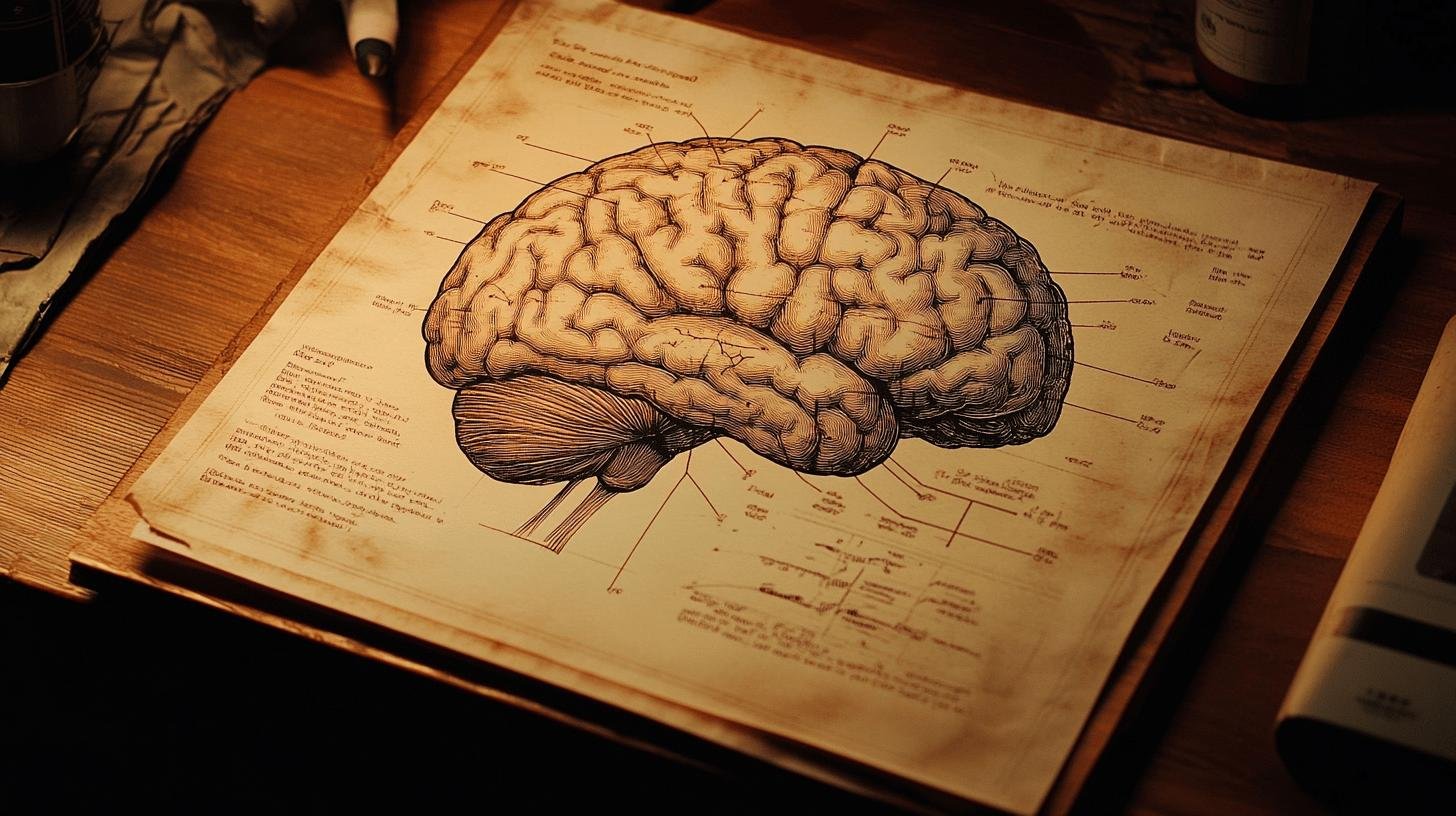TL;DR:
- Alcohol-related brain damage (ARBD) can cause cognitive impairments, mood swings, and memory loss.
- Wernicke-Korsakoff syndrome results from ARBD, caused by vitamin B1 deficiency due to alcohol.
- Common symptoms include balance issues, memory impairment, blurred vision, slurred speech, and tremors.
- Diagnosing involves medical history, neurological exams, and brain imaging (MRIs).
- Treatments include thiamine therapy, lifestyle changes (quitting alcohol, exercise), and personalized care plans.
- Long-term effects of alcohol abuse are cognitive impairments and brain shrinkage.
- Prevention strategies include limiting alcohol intake, seeking addiction help, getting a balanced diet, exercising, and getting proper sleep.
- Direct primary care offers personalized healthcare management for alcohol-related brain diseases.
Ever wondered how alcohol can mess with your brain? It’s not just about the hangovers; the risks are way more severe, like developing brain diseases from alcohol abuse. Yes, long-term alcohol abuse can actually lead to brain diseases, impacting both structure and function. We’re talking real heavy stuff like Wernicke-Korsakoff syndrome or even alcoholic dementia. This isn’t just a buzzkill—it’s about understanding the price our brains pay for heavy drinking. Let’s dig into the science, the symptoms, and what can be done. Ready to rethink that next drink? Cheers to knowledge and making informed choices!
Understanding Brain Diseases from Alcohol Abuse
Alcohol-related brain damage (ARBD) is a serious effect of heavy drinking. It affects both the structure and function of the brain. You might wonder, “What exactly does ARBD do?” Well, it can lead to issues like memory lapses and mood swings, even severe cognitive impairments. Long-term alcohol use is not just a temporary problem. It leaves a lasting mark on mental and physical health.
Have you heard of Wernicke-Korsakoff syndrome? This condition is a well-known consequence of alcohol abuse. It’s essentially two issues wrapped into one: Wernicke’s encephalopathy and Korsakoff’s psychosis. Wernicke’s brings confusion and coordination problems, while Korsakoff’s leads to serious memory trouble. This syndrome is mainly due to a lack of vitamin B1 since alcohol disrupts nutrient absorption. If your memory feels foggy after years of drinking, this could be the reason.
Many think ARBD only strikes older adults, but that’s not true. While it’s more common in people in their 50s and 60s, younger adults in their 30s and 40s are increasingly affected. Women are at higher risk earlier on. This should serve as a wake-up call for those who believe youth offers protection. The key takeaway? Regardless of your age, heavy drinking can pave the way for serious brain diseases.
Mechanisms of Alcohol-Induced Brain Damage

When someone wonders, “How does alcohol affect our brains?” the answer involves more than just feeling tipsy. Alcohol tampers with neurotransmitters like GABA and glutamate. GABA acts like the brain’s calming agent, which alcohol enhances, leading to relaxation. In contrast, glutamate excites neurons, and alcohol suppresses it, slowing brain activities. These combined effects can impair brain pathways and cause long-term damage.
Have you heard of brain shrinkage? It’s real, and alcohol is a major cause. Prolonged drinking can reduce brain volume, as though from a sci-fi movie plot, leading to cognitive problems. This includes memory loss, decision-making issues, and mood swings. It’s like living with a never-ending hangover, struggling with daily tasks.
Alcohol-induced brain lesions are another damaging effect. These lesions resemble scars on the brain, indicating areas where alcohol has wrought havoc. They can cause neurological damage, affecting movement and memory. Lesions are often visible in imaging studies of heavy drinkers, illustrating alcohol’s toll on brain health.
Here’s a list of the main neurotransmitters affected by alcohol:
- GABA: Increases, causing relaxation.
- Glutamate: Decreases, slowing brain activity.
- Dopamine: Temporarily spikes, providing a feel-good sensation.
- Serotonin: Alters mood and sleep.
- Norepinephrine: Decreases, impacting alertness.
These changes might seem appealing at first, but over time, they can lead to serious neurological issues. So, when you reach for that drink, spare a thought for your brain.
Recognizing Symptoms and Diagnosing Alcohol-Related Brain Conditions
Ever wonder what signs to watch for if you suspect alcohol is harming your brain? Recognizing symptoms of alcohol-induced brain diseases can be crucial. Common signs include balance issues, memory impairment, and blurred vision. It’s like your brain’s wiring is malfunctioning. You might also notice slurred speech and tremors—imagine feeling unsteady while speaking confusingly. These symptoms can creep in after prolonged alcohol use, and ignoring them is like ignoring a red flag in your health.
How do doctors figure out what’s happening? Diagnosing alcohol-related brain conditions is complex. It starts with reviewing your medical history and conducting neurological exams to check reflexes, muscle strength, and coordination. Brain imaging techniques, like MRIs, are also useful. These images reveal areas where alcohol has left its mark, helping piece together the internal puzzle.
Diagnosing these conditions can be challenging. Symptoms often overlap with other health issues, making it difficult to identify them initially. People may not display symptoms the same way or at the same time, leading some to ignore early signs. Doctors must be thorough, often relying on multiple tests to form a clear picture. It’s puzzling work, but early identification can make a big difference.
| Symptom | Diagnostic Method |
|——————|————————–|
| Balance issues | Neurological exam |
| Memory impairment| Medical history review |
| Blurred vision | Brain imaging (MRI) |
| Slurred speech | Neurological exam |
| Tremors | Neurological exam |
Don’t dismiss these signs when you notice them. Your brain deserves attention, and early diagnosis provides a fighting chance.
Treatment Options for Alcohol-Induced Brain Damage

Thiamine replacement therapy is vital for treating alcohol-induced brain damage. You might wonder, “Why thiamine?” Alcohol disrupts your body’s absorption of this essential vitamin, leading to conditions like Wernicke-Korsakoff syndrome. Early thiamine treatment can reverse some symptoms, providing a much-needed boost to counteract the damage. If dealing with alcohol-related brain issues, thiamine acts as the brain’s first line of defence.
Lifestyle changes play an underrated role in recovery. Quitting alcohol is crucial, but there’s more to consider. Regular exercise and a stable sleep routine can work wonders. Exercise releases feel-good chemicals in your brain, offering a natural high without the bad side effects. Adequate sleep aids the brain’s repair processes. It’s like giving your brain a chance to rest and recover.
Medical interventions are also important. Apart from thiamine, doctors may prescribe medications to manage symptoms like anxiety or depression. Cognitive therapies can improve memory and problem-solving skills. It’s like having a team of brain specialists addressing different issues. These interventions support the brain in regaining some lost functions.
Personalized care plans add a special touch. They’re tailored to meet unique individual needs, considering medical history and lifestyle preferences. This approach ensures that treatment isn’t one-size-fits-all. It maximizes recovery effectiveness, acting like a customized suit for your health needs.
Role of Nutrition in Brain Recovery
Nutrition significantly impacts brain recovery. Ever heard the saying “You are what you eat”? Your brain’s health relies heavily on your diet. A diet rich in vitamins and minerals aids in repairing damaged brain cells. Foods high in antioxidants, like berries and nuts, protect the brain from more damage. Omega-3 fatty acids found in fish support brain health by maintaining cell structure.
Eating a balanced diet aids immediate recovery and builds a strong foundation for long-term brain health. So, consider every meal as fueling your brain for healing and thriving.
Long-Term Effects and Prevention of Brain Damage from Alcohol
Have you ever asked yourself, “What’s the long-term effect of alcohol on my brain?” Here’s the truth. Long-term alcohol use can lead to serious cognitive impairments. Expect memory loss, difficulties in decision-making, and mood swings. It’s like your brain is slowly being rewired negatively. This isn’t just about mental problems. Physically, brain shrinkage is a concern. Alcohol can reduce brain volume over time. So, it’s a double threat: cognitive and structural changes disrupting the brain.
Wondering how to prevent this? Good thing you asked! Prevention strategies can protect your brain. Start with responsible drinking. Know your limits and stick to them. Seek help if you’re battling addiction. It’s a smart move with no shame involved. Focus on nutrition—eat a balanced diet to safeguard your brain. Regular exercise is crucial, benefiting both body and mind. And don’t underestimate proper sleep; it’s essential for brain recovery.
Here’s a list of prevention strategies to keep your brain clear:
- Limit alcohol intake to safe levels
- Seek help for alcohol addiction
- Maintain a nutrient-rich balanced diet
- Engage in regular physical activity
- Ensure good quality and sufficient sleep
Early intervention offers your brain a head start against damage. Recognizing early signs allows change before things worsen. Nipping issues in the bud gives your brain the best chance to recover. If you or others notice changes, act quickly. Your brain will appreciate it.
The Role of Direct Primary Care in Managing Alcohol-Related Brain Diseases

Direct primary care (DPC) feels like having a dedicated healthcare companion in managing alcohol addiction and its brain effects. Why? DPC provides personalized attention, focusing on prevention, early intervention, and continuous support. Imagine freely discussing concerns with your doctor without rushing or red tape—that’s DPC! It encourages strong relationships between patients and providers, optimizing the management of alcohol-related brain diseases.
Personalized treatment plans are crucial in patient recovery. DPC doctors tailor plans to fit your unique health needs and lifestyle. It’s like having a personalized roadmap to recovery. The flexibility in treatment adjustments ensures you receive the right care when needed. This customization is vital for addressing the complex nature of brain diseases from alcohol.
Financially, DPC is wallet-friendly! It eliminates the middleman of traditional insurance models. You pay a simple fee, with no surprise bills or bewildering co-pays. This transparency ensures that finances don’t become a barrier to getting help. It simplifies healthcare, offering quality care accessible to everyone, not just those with deep pockets. DPC could be the right path if you seek a cost-effective approach to managing these conditions.
Final Words
We’ve taken a deep dive into brain diseases from alcohol abuse, focusing on how excessive drinking can harm the brain over time. From specific conditions like Wernicke-Korsakoff syndrome to the role of neurotransmitters in causing neurological damage, there’s a lot to unpack. Recognizing symptoms early and understanding diagnostic options can lead to better management and recovery.
Direct primary care plays a key role in offering personalized support, making it a valuable ally in tackling these challenges. Remember, positive change starts with awareness and action.
FAQ
What brain damage can you get from alcohol?
Alcohol can cause various types of brain damage, including Wernicke-Korsakoff syndrome and alcoholic dementia. These conditions affect brain structure and function, leading to memory loss and cognitive issues.
What are the symptoms of Korsakoff syndrome?
Korsakoff syndrome symptoms often include severe memory problems, confusion, lack of coordination, and difficulty learning new skills. These symptoms are due to chronic alcohol abuse affecting brain function over time.
What is the first stage of Wernicke-Korsakoff syndrome?
The first stage of Wernicke-Korsakoff syndrome is called Wernicke’s encephalopathy. It presents with symptoms like confusion, coordination issues, eye movement disturbances, and problems with memory. It’s crucial to seek treatment early.
What are the symptoms of alcoholic encephalopathy?
Symptoms of alcoholic encephalopathy typically include confusion, tremors, muscle weakness, and hallucinations. These symptoms result from long-term alcohol abuse impacting brain health and function.

